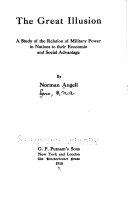Quotes from book
The Great Illusion

The Great Illusion is a book by Norman Angell, first published in the United Kingdom in 1909 under the title Europe's Optical Illusion and republished in 1910 and subsequently in various enlarged and revised editions under the title The Great Illusion.

“This book endeavors to clear away the mists which prevent so many from seeing the road.”
The Great Illusion (1910)

The Great Illusion (1910)
Context: The prosperity of a people depends upon such facts as the natural wealth of the country in which they live, their social discipline and industrial character, the result of generations, of centuries, it may be, of tradition. In addition it depends upon a special technical capacity for such-and-such a manufacture, a special aptitude for meeting the peculiarities of such-and-such a market, the efficient equipment of elaborately constructed workshops, and the existence of a population trained to given trades.

The Great Illusion (1910)
Context: The elaborate financial interdependence of the modern world has grown up in spite of ourselves. Men are fundamentally just as disposed as they were at any time to take wealth that does not belong to them. But their relative interest in the matter has changed.
In very primitive conditions robbery is a moderately profitable enterprise. Where the rewards of labor are small and uncertain, and where all wealth is portable, the size of a man’s wealth depends a good deal on the size of his club and the agility with which he wields it. But to the man whose wealth so largely depends upon his credit, dishonesty has become as precarious and profitless as honest toil was in more primitive times. The instincts of the City man may at bottom be just as predatory as those of the robber baron, but taking property by force has been rendered impossible by the force of commercial events.

The Great Illusion (1910)
Context: The fight for ideals can no longer take the form of fight between nations, because the lines of division on moral questions are within the nations themselves and intersect the political frontiers. There is no modern State which is completely Catholic or Protestant, or liberal or autocratic, or aristocratic or democratic, or socialist or individualist; the moral and spiritual struggles of the modern world go on between citizens of the same State in unconscious intellectual cooperation with corresponding groups in other states, not between the public powers of rival States.